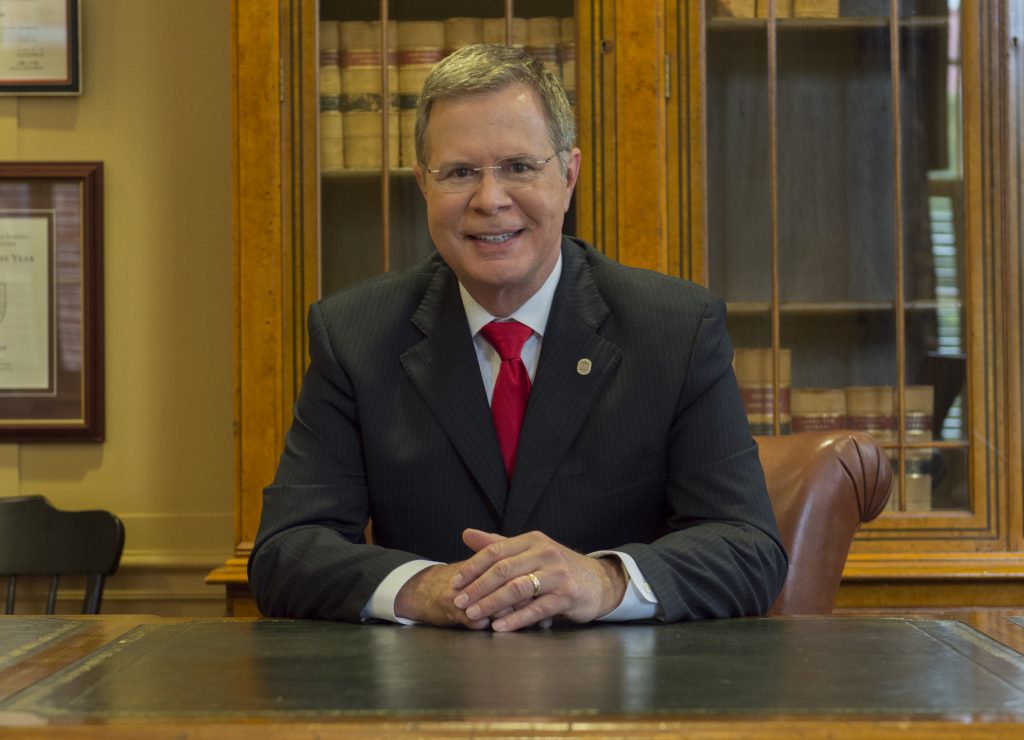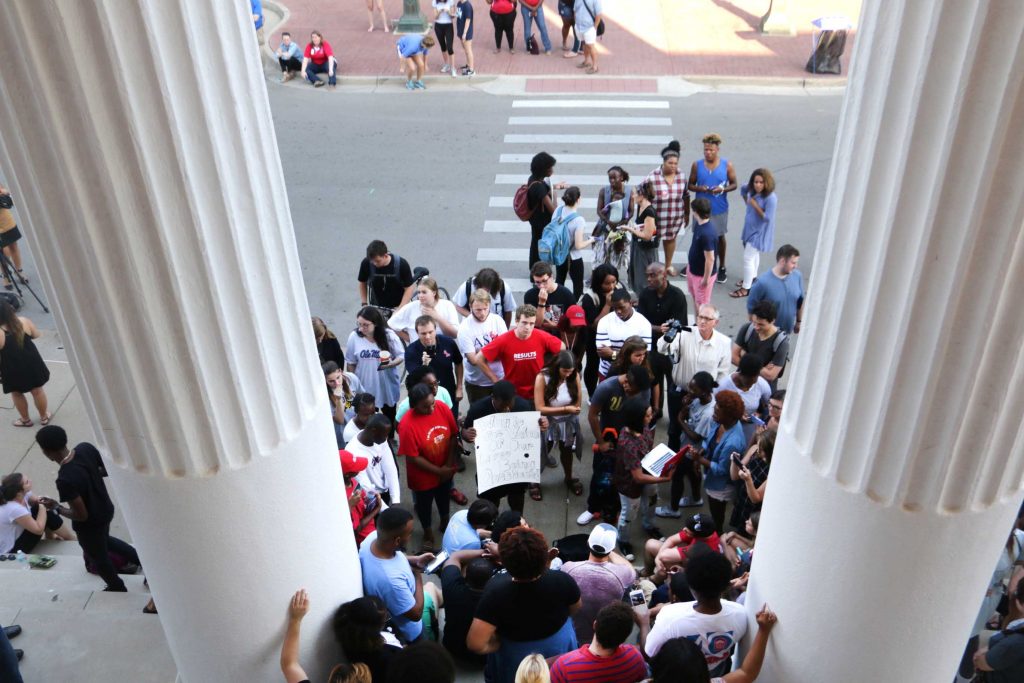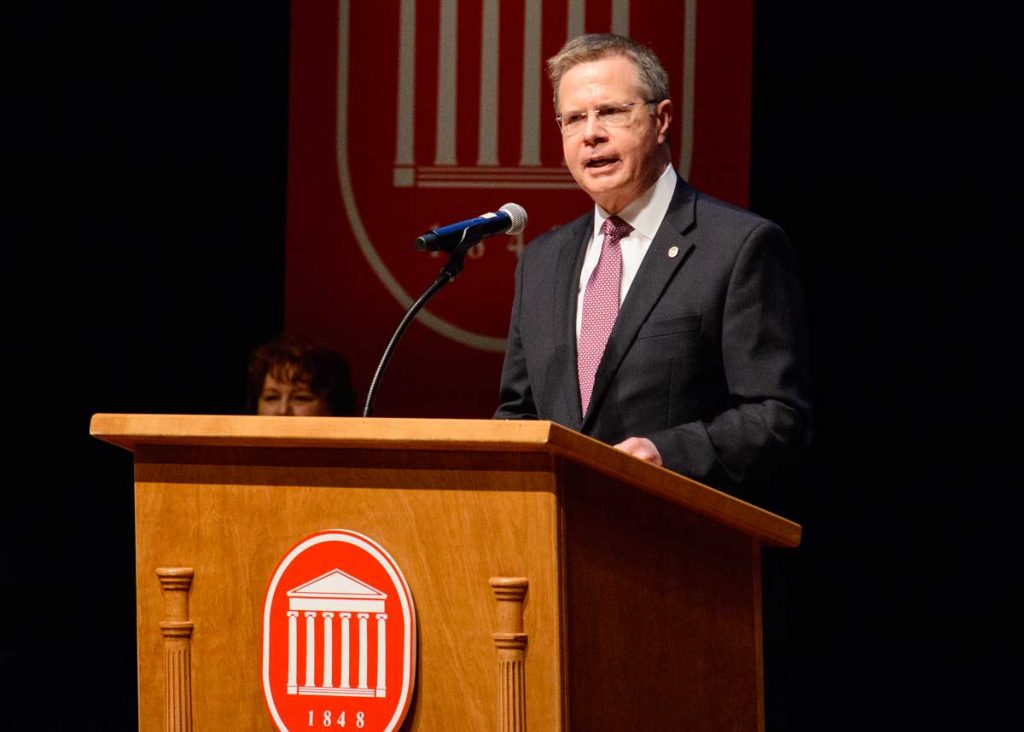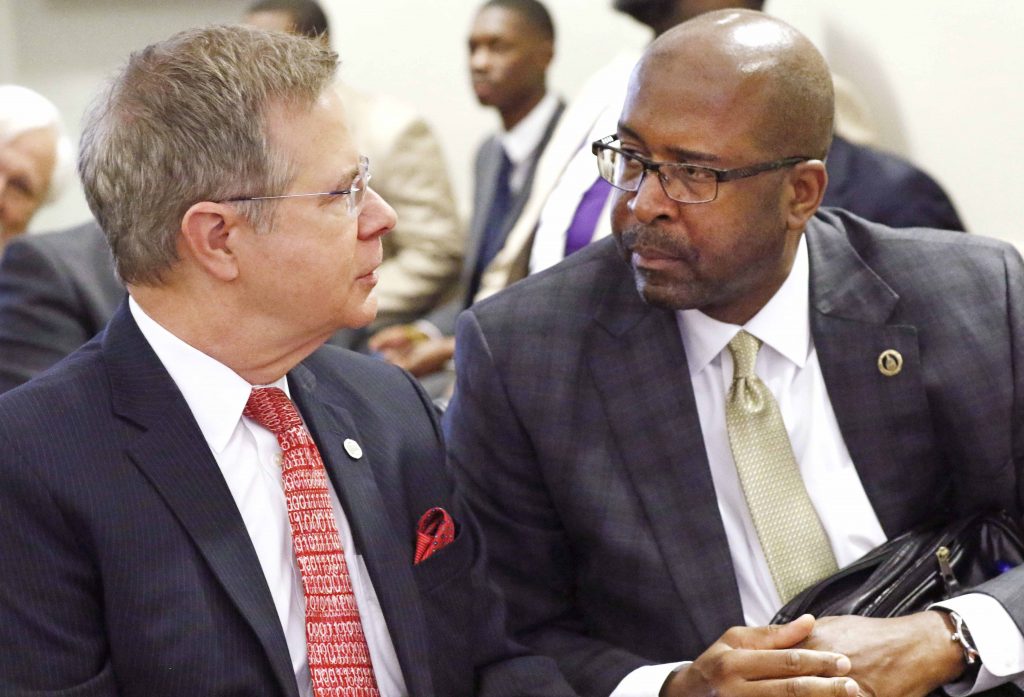With Chancellor Jeffrey Vitter’s resignation now confirmed, The Daily Mississippian compiled a rundown of noteworthy moments from throughout Vitter’s three years at Ole Miss. Click here for a gallery of images from Vitter’s time at Ole Miss.
The college board announced Jeffrey S. Vitter as the 17th chancellor of the University of Mississippi on Oct. 29, 2015. Prior to arriving at Ole Miss, Vitter served as the executive vice chancellor at the University of Kansas. He took the University of Mississippi position on Jan. 1, 2016.

Chancellor Vitter sits in his office. File photo by Christian Johnson
Jan. 29, 2016 – Ole Miss received a Notice of Allegations from the NCAA’s enforcement staff alleging roughly 30 violations.
Sept. 23, 2016 – Students flooded the Lyceum halls for “Occupy the Lyceum” to protest the university’s lack of reaction to a racist Facebook comment posted by an Ole Miss business student.
“The university leadership and I are aware of recent comments made on social media that have generated concern by members of the Ole Miss community,” a statement released by Vitter at the time said. “The University of Mississippi condemns the use of language that might encourage or condone violence. Instead, let’s be respectful and civil in our discourse, as called for in the Creed.”

Students have civil dialogue with Andrew Soper, previous ASB Senator, and sponsor of Our State Flag Foundation on the steps of the Lyceum after several students voice their concern about him being in the Lyceum during the sit-in. File photo by Ariel Cobbert

Nov. 10, 2016 – Vitter’s investiture ceremony took place on Nov. 10, 2016. “I am privileged to be your partner in building a vibrant Mississippi through higher education,” Vitter said during the ceremony.
July 20, 2017 – Hugh Freeze resigned on July 20, 2017 after a lawsuit by Houston Nutt prompted the university to hand over phone records from six days in January 2016, and a phone call to an alleged escort service was found. Vitter commented on the resignation, saying the university found “a pattern of personal misconduct inconsistent with the standards expected from the leader of our football team.”
The NCAA released its final ruling on the case of Ole Miss’ infractions earlier this semester. Click here to read our report on the ruling.
On Oct. 2, 2017, the student body voted to replace the Rebel the Black Bear mascot with the Landshark. On August 20, 2018, Ole Miss Athletics unveiled Tony the Landshark, named for former Ole Miss football player and veteran, Tony Fein.
The 2016-2018 contextualization process – Vitter announced the formation of the Chancellor’s Advisory Committee for History and Context (CACHC) on March 29, 2016 to further review historic buildings, symbols and other campus elements for contextualization. The committee’s final report, including plans for the creation of six contextualization plaques, was released on July 6, 2017. The contextualization plaques were unveiled on campus during a ceremony on March 2, 2018. “These plaques are daily reminders of our obligation to learn from the past and commit to an inclusive future,” Vitter said.

Chancellor Jeffrey Vitter welcomes attendees during the UM History and Context Plaque Ceremony at the Ford Center earlier this year. File photo by Marlee Crawford
Sept. 19, 2018 – UM donor and namesake of the Meek School of Journalism & New Media, Ed Meek, made a post that garnered criticism from the chancellor, students and the community.
Vitter posted a statement to Facebook, saying “While we all want to ensure a safe, family-friendly environment at the university and in Oxford, I must condemn the tone and content of Ed Meek’s post from earlier today. The photos in his post suggest an unjustified racial overtone that is highly offensive. Ed, I urge you to withdraw your comment and apologize to anyone offended.”
On Oct. 18, the state Board of Education announced their approval of the journalism school’s name change following a request from Meek, the school of journalism and ultimately, Vitter, that the name be removed.

University of Southern Mississippi president Rodney D. Bennett, right, and University of Mississippi Chancellor Jeffrey S. Vitter, confer at the Mississippi Institutions of Higher Learning’s monthly meeting in Jackson on Thursday. Members of the state College Board voted to strip Ed Meek’s name from the Meek School of Journalism and New Media nearly a month after his Facebook post drew backlash for being racist. AP Photo/Rogelio V. Solis
During his tenure, Vitter oversaw a university-wide construction program with $709 million in projects planned or underway, according to IHL’s press release announcing his resignation.
The university has also established five new academic centers and institutes, including the Haley Barbour Center for the Study of American Politics, the Center for Multi-Messenger Astrophysics and the University of Mississippi Institute for the Arts, under Vitter.

Chancellor Jeffrey Vitter speaks to a member of the Ole Miss Air Force ROTC on Thursday during the Chancellor’s Review Ceremony. Photo by Parker Galloway
The University of Mississippi’s enrollment dropped for two consecutive years in 2017 and 2018. In fall 2016, enrollment was at 24,250 and by fall 2018 had dropped to 23,258.
In Feb. 2016, the university earned its first-ever R-1 designation by the Carnegie Classification of Institutions of Higher Education, the definitive list for doctoral research universities that places UM among the top 2.5 percent of all colleges and universities in the U.S.






